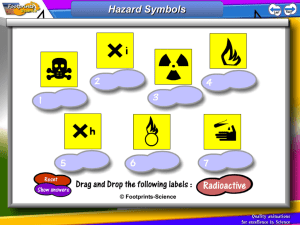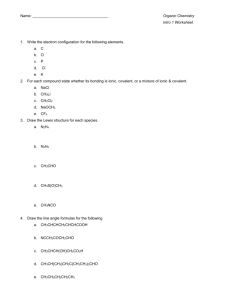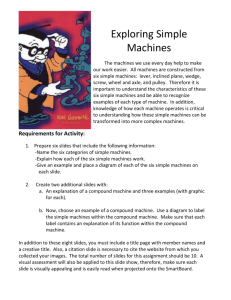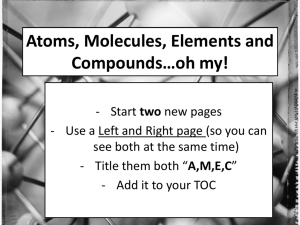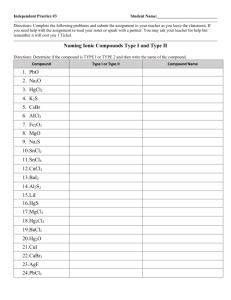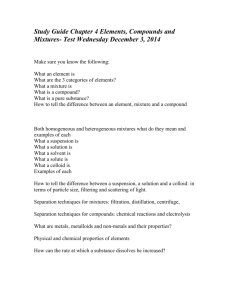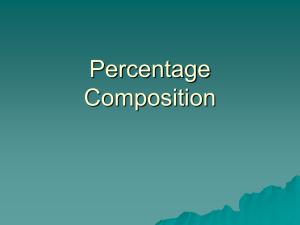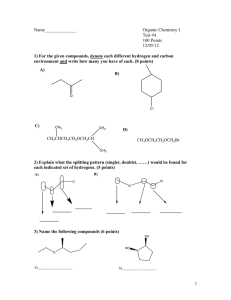Warm Up 9/23/13
advertisement
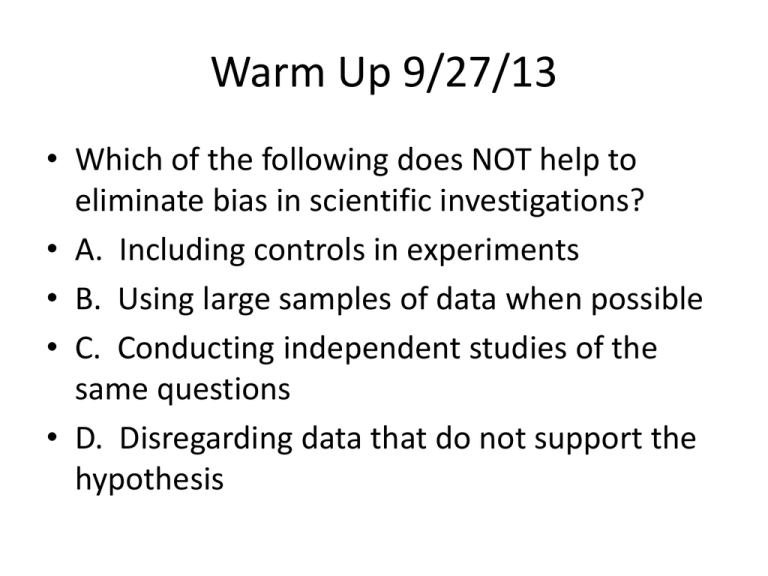
Warm Up 9/27/13 • Which of the following does NOT help to eliminate bias in scientific investigations? • A. Including controls in experiments • B. Using large samples of data when possible • C. Conducting independent studies of the same questions • D. Disregarding data that do not support the hypothesis Warm Up 9/27/13 • Which of the following does NOT help to eliminate bias in scientific investigations? A. Including controls in experiments B. Using large samples of data when possible C. Conducting independent studies of the same questions • D. Disregarding data that do not support the hypothesis Agenda & Homework • KEEP warm-ups (short week next week) • Independent group work (groups will be assigned) • Choice board • Magazine • Footprint Forensics activity • Skills Tutor/other computer work • No homework!! 2nd Period 1. Choice Board: Jamiah, Lorraine, Diego, Victor, Justin, Adam 2. Choice Board: Charles, Maya, Andres, Rosy, Capri, Damani 3. Magazine: Ebrima, Ed’Zavian, Quan, Decarlo, Chase, Jeremiah 4. Magazine: Ashley, Taj , Aja, Danny, 5. Forensic Footprints: LaQuaris, Ciara, Anna, Natalie, Jennifer, Kaiya 6. Computer: Mykyria, Khari, Zechariah, Shakiriah, Timiya (then Kaiya) 3rd Period 1. Choice Board: Gyonni, Chris, Jordan, Thomas, Haven, Reggie 2. Choice Board: Shaniah, Jocelyn, Bruce, Edna, Christian, Terrence 3. Magazine: Jaileny, Cameron, Erinn, Ashlee, Jaquez, Ja’Sean 4. Magazine: Deshawn, Hunter, Davon, Tiffany, 5. Forensic Footprints: Colette, Andrew, Samaria, Muhammed, Kareem, Hope 6. Computer: Icesis, Fatima, Cyrus, Edna, Kyle 4th Period 1. Choice Board: Kevin, Amin, Lena A., Kerren, Davyon, Jadah 2. Choice Board: Karla, Alena, Nick, John D, Evan, Amariah 3. Magazine: Tatyahna, Javaughn, Collin, Chris P, Monica, Ketasia 4. Magazine: Syeda, Chris R, Precious, Stephen, Siani, Alexis 5. Forensic Footprints: Trevanni, Anthony R, Kevyn, Tyler 6. Computer: Vitoria, Lena B, John B, Isaiah, Jaquan Warm Up 9/27/13 • What is the smallest unit of a chemical compound that still has the properties of that compound? • A. A nucleus • B. A molecule • C. An element • D. An atom Warm Up 9/27/13 • What is the smallest unit of a chemical compound that still has the properties of that compound? • A. A nucleus • B. A molecule • C. An element • D. An atom Agenda & Homework • • • • • Turn in extra credit & remediation packets Review & turn in HW from Wednesday KEEP warm-ups (short week next week) Finalize labs Atoms Family Notes • No homework!! Chapter 11, pg 323 1. (0.20 x 10 AMU) + (0.80 x 11 AMU) = 10.8 AMU 2. (0.72 x 85 AMU) + (0.28 x 87 AMU) = 85.56 AMU 3. (0.60 x 69 AMU) + (0.40 x 71 AMU) = 69.8 AMU 4. (0.52 x 107 AMU) + (0.48 x 109 AMU) = 107.96 AMU 5. (0.92 x 28) + (0.05 x 29) + (0.03 x 30) = 28.11 Page 325, 2 – 6 & 9 • • • • 2. atomic number 3. atomic mass 4. b. neutron 5. pg 324 (gravitational, electromagnetic, strong, weak) • 6. (0.30 x 203 AMU) + (0.70 x 205 AMU) = 204.4 AMU • 9. Different PROTONS = DIFFERENT elements!! Warm Up 9/26/13 Which of the following is a reason that compounds are considered pure substances? A. They are only composed of one type of particle B. The substance is made of two or more elements that are physically combined C. Different samples of any compound have elements of different densities D. They can be separated by physical methods Warm Up 9/26/13 Which of the following is a reason that compounds are considered pure substances? A. They are only composed of one type of particle B. The substance is made of two or more elements that are physically combined C. Different samples of any compound have elements of different densities D. They can be separated by physical methods Agenda & Homework • Turn in Ch 11 bookwork • Set up hydrolysis labs • Finish separation of mixture lab while hydrolysis is going • Homework: None! Unless you haven’t finished Skills Tutor, because zeros are going in soon. Mixture Lab • Total mass should be about 25 grams +/• Each sections of beads should be about 5 – 7 grams +/• Percentages should be between 20 & 30% +/• Added together, you should get 100%! • NO, you all should NOT have the same, but they will be close On a piece of paper… • Was the bead and water mixture homogeneous or heterogeneous? How could you tell? • Was it a solution, suspension, or colloid? How could you tell? • What property did you use to separate the beads? • Was that physical or chemical? How do you know? On a piece of paper… • Was the bead and water mixture homogeneous or heterogeneous? How could you tell? You could see the parts! • Was it a solution, suspension, or colloid? How could you tell? You could see them & they would settle • What property did you use to separate the beads? DENSITY • Was that physical or chemical? How do you know? We didn’t change the plastic or the water Hydrolysis Observations Pencil Set-up • Bubble rising from pencils • More bubble from the negative side (H2 gas) • Fewer bubbles from the positive side (O2 gas) Indicator Set-up • Color change & bubbles by clips • More blue on the negative side (H2 gas left an OHbase) • Less pink on the positive side (O2 gas left H+ acid) Same paper… • Sketch the two set-ups on your table. • Write at least three observations about each about what happens • Based on what you know, what is happening in each set up? A chemical change – creating a different substance (O2 & H2 from H2O) Test Today 9/25/13 • Study for 10 minutes (chapter 4 work, warmups, worksheets, and last quiz) • Test will be with i-respond • Don’t forget to hit SEND after EACH answer!! • When through, turn test upside down (I will collect • Read Chapter 11, and complete 1 – 5 on page 323, and 2-6 & 9 on page 325 Warm Up 9/24/13 How is a compound different from a mixture? A. Compounds have two or more components. B. Each substance in a compound loses its characteristic properties. C. Compounds are commonly found in nature. D. Solids, liquids, and gases can form compounds. Warm Up 9/24/13 How is a compound different from a mixture? A. Compounds have two or more components. B. Each substance in a compound loses its characteristic properties. C. Compounds are commonly found in nature. D. Solids, liquids, and gases can form compounds. Agenda & Homework • • • • Review bookwork from chapter 4 Review yellow molecule sheet I have…who has… Closing Assessment Probe • Homework: Complete all online assignments (Skills Tutor & Brain Pop – they are in Synergy) Pages 108 – 109, #1 - 15 1. 2. 3. 4. 5. 6. 7. 8. Compound Solubility Suspension Element Nonmetal Solute C B 9. C 10. B 11. C 12. A 13. C 14. A 15. Elements cannot be separated into simpler substances, but compounds can by chemical means Molecule Models # of dif el # of dif comp 1 0 1 0 1 0 # of mol O2 H2 N2 # of atoms 2 2 2 1 1 1 Is it pure? Y Y Y NaCl NH3 CH4 2 4 5 2 2 2 1 1 1 1 1 1 Y Y Y H2O CO2 3 3 2 2 1 1 1 1 Y y Warm Up 9/24/13 • Which of these statements about a hypothesis is true? • A. It is valuable only when proved accurate • B. It may be valuable even when it turns out inaccurate • C. It is determined after a scientists experiments • D. It provides a basis for changing data Warm Up 9/24/13 • Which of these statements about a hypothesis is true? • A. It is valuable only when proved accurate NO, NICE BUT NOT NECESSARY • B. It may be valuable even when it turns out inaccurate • C. It is determined after a scientists experiments BEFORE • D. It provides a basis for changing data NEVER Agenda & Homework • Footprint Mystery Directions – ALL except – Science World magazine assignment – Start putting together portfolio for choice board (I will work with groups) – Finish Circle Map (certain groups) – Computer Work (certain people) • Homework: SKILLS TUTOR (Math Section due Friday) Footprint Mystery • Color footprints according to the key • Analyze the data by putting it in the data table • Answer questions in packet To Finish (in order of priority) • Testable Questions (list of 10 testable & non-testable) • Background Research (six research questions on a SPECIFIC topic – or- brochure) • Observations & Inferences (fable AND observation) • Data (powerpoint or Tidy Clean (27A & B) • Drawing Conclusions (cartoon/go animate/437A & B • Science World magazine assignment • Poster (certain classes) • Footprints Forensics activity Warm Up 9/23/13 If two poisonous elements are combined chemically, which of the following will be true of the resulting compound? A. The compound will be more poisonous than the gases. B. The compound will be as poisonous as the gases. C. The compound may or may not be poisonous. D. The compound will not be poisonous. Warm Up 9/23/13 If two poisonous elements are combined chemically, which of the following will be true of the resulting compound? A. The compound will be more poisonous than the gases. B. The compound will be as poisonous as the gases. C. The compound may or may not be poisonous. D. The compound will not be poisonous. Agenda & Homework • • • • Warm-Up Review quiz Review pink worksheet I have…who has…? • Homework: Complete all online assignments Properties of Metals & Nonmetals • • • • • • • • Metals – Malleable Lustrous Ductile Conductor Metallic bonding Gives away electrons Making positive ions • • • • • • Examples Zinc Nickel Gold Titanium Thallium Properties of Metals & Nonmetals • • • • • • Nonmetals – Covalent bonding Forms negative ions Brittle Nonconductor Gaseous at room temperature • Receives electrons • • • • • • Examples – Selenium Boron Argon Helium Phosphorus Mixtures, Compounds, Solutions Mixtures Milk Compounds Water Coffee Air Ink Blood Sand Carbon dioxide Ammonia Sugar Alcohol Table salt Solutions Rubbing alcohol Sugar water Salt water Soda Humidity Brass Warm Up 9/23/13 • Which technological tool would be most useful for storing and retrieving data? • A. Balance • B. Model • C. Computer • D. Beaker Warm Up 9/23/13 • Which technological tool would be most useful for storing and retrieving data? • A. Balance • B. Model • C. Computer • D. Beaker Agenda & Homework • Smart Board - variables • Fransesco Redi’s Experiment • Working on Drawing Conclusions choice • Homework: Skills Tutor • http://www.solpass.org/5s/Games/Scientific MethodPlank.html • http://faculty.washington.edu/chudler/experi. html
